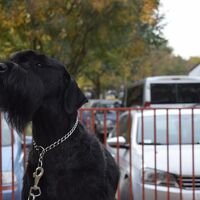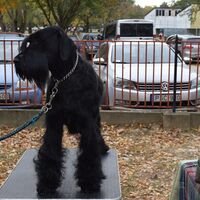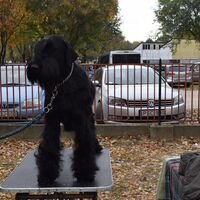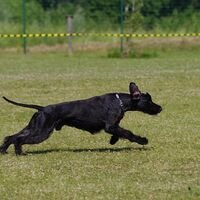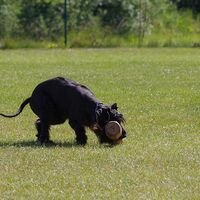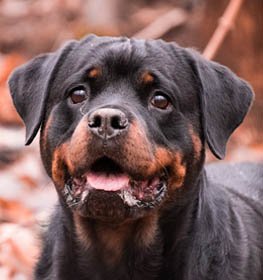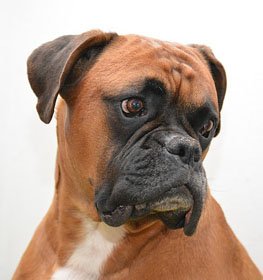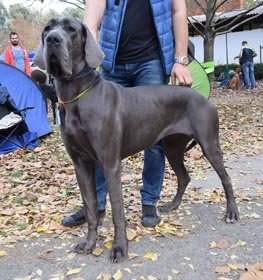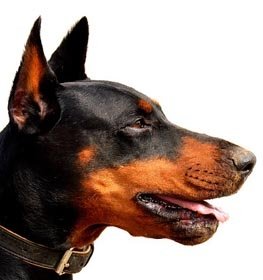Giant Schnauzer Information & Dog Breed Facts
Collection of all the general dog breed info about Giant Schnauzer so you can get to know the breed more.
| Group | Working Dogs |
|---|---|
| Popularity Rank | 80 |
| Reviews | 4 |
| User Ratings | |
|
Compare the Giant Schnauzer With Other Dogs
Select at least one dog breed to make the comparsion. | |
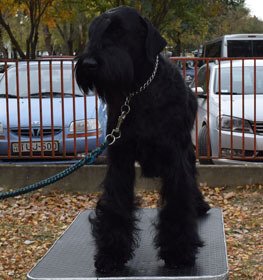 | |
| Origin | |
|
Common Names & Aliases
What other names is a Giant Schnauzer known by? Discover all traditional, regional and informal names used for this breed. | Riesenschnauzer |
|---|---|
|
Breed Classification
What type of dog breed is a Giant Schnauzer? Learn about its genetic classification and breeding category. | Purebred |
Photo Gallery of the Giant Schnauzer Breed
|
Size Classification
What size category is a Giant Schnauzer? Learn how big the Giant Schnauzer breed typically grows. | Giant |
|---|---|
|
Weight Statistics
How much does a Giant Schnauzer weigh? Discover typical weight ranges for adult males and females of the Giant Schnauzer breed. | Males 60-105 pounds (27-48 kg), Female: 55-75 pounds (25-34 kg) |
|
Average Weight
What is the average weight of a Giant Schnauzer? | Males 82.5 pounds (37.5 kg), Female: 65 pounds (29.5 kg) |
|
Height
How tall is the Giant Schnauzer? Giant Schnauzer height: | Male: 26-28 inches (66-71 cm), Female: 23-26 inches (58-66 cm) |
|
Average Height
What is the average height of a Giant Schnauzer? | Male: 27 inches (68.5 cm), Female: 24.5 inches (62 cm) |
|
Price Range
How much does a Giant Schnauzer puppy cost? Find current market prices and factors affecting Giant Schnauzer costs. | $1000-$1500 If you choose to purchase the Giant Schnauzer, you should know that the mentioned amount of money is an average of the collected data from breeders’ sites and puppy finder places. If you have a Giant Schnauzer for sale, please advertise it on a reliable website to make sure the Giant Schnauzer gets to a happy place. |
|---|---|
|
Availability
How easy is it to get a Giant Schnauzer? How many Giant Schnauzer are there in the world? | Very frequent: The Giant Schnauzer is quite easy to get. There is a risk of overbreeding, as it is an extremely popular breed. Inbreeding is common because of its popularity. A new study suggests that inbreeding contributes to the incidence of disease and health problems. So be careful, buy from a trustworthy place or kennel and seek the help of an experienced person, a professional, to make the right decision. |
|
Intelligence Rating
How intelligent is a Giant Schnauzer? Discover the Giant Schnauzer's intelligence ranking and learning capabilities. | Smart: The Giant Schnauzer dogs have great intelligence. They understand and memorize new commands in 15-25 repetitions.
The Giant Schnauzer is among the smartest dogs in the intelligence ranking. |
|---|---|
|
Training Difficulty
How easy is it to train a Giant Schnauzer? Learn about the Giant Schnauzer's trainability and response to training methods. | Giant Schnauzer dogs are easy to train. They find out the association between commands and actions quite quickly. |
|
Watchdog Rating
How good is a Giant Schnauzer as a watchdog? Learn about the Giant Schnauzer's alertness and guarding instincts. | Giant Schnauzer dogs are one of the best watchdogs. Their main job is to observe and they're very consistent in their effort. The best vocal cords and sense of hearing belong to them. Usually, they're very territorial and protective about their property, so the Giant Schnauzer dogs will alert you if they sense something different. |
|
Territorial Protection
Is a Giant Schnauzer protective of its territory? Learn about the Giant Schnauzer's guarding instincts and behavior. | Giant Schnauzer dogs are extremely protective guard dogs. This breed doesn't hesitate to protect its territory so the Giant Schnauzer can be a good choice if you want an excellent guard dog. Keep calm and the Giant Schnauzer will take care of unwanted people or animals. |
|
Personality Traits
What personality does a Giant Schnauzer have? Learn about characteristic Giant Schnauzer temperament and behavior traits. | PowerfulIntelligentDominantLoyalKindStrongWilled |
|---|---|
|
Sensitivity Level
How sensitive are they? Giant Schnauzer sensitivity: | They are a little bit more sensitive than other dog breeds. Soft punishment affects them emotionally. Giant Schnauzer dogs don't tolerate irregular daily routines, noisy households, and frequent guest visits really well.
They are receptive to their owner's emotions and make wonderful family companions. |
|
Affection Level
How affectionate are they? Is a Giant Schnauzer a good family dog? | Average: Giant Schnauzer dogs are average dogs regarding their affection level. Some breeds are forthcoming and friendly, while others are independent and don't bond too closely with their owners. |
|
Social Needs
How much social interaction does the Riesenschnauzer need? Giant Schnauzer social needs: | Giant Schnauzer dogs need for social interaction is average. This breed likes being around people or other animals, but they don't mind being left alone for a few hours either. |
|
Impulse to Wander or Roam
How likely is the Giant Schnauzer to run away? Does this breed explore or wander a lot? Does Giant Schnauzer roam? | The wanderlust potential of the Giant Schnauzer is strong enough to escape from home. They have a strong desire for exploring the world. Safer to walk them on a leash unless you teach them how to get back to you on command. |
|
Prey Drive
Do this canine have a strong prey drive? Does Giant Schnauzer have high prey drive? | Giant Schnauzer dogs have a higher impulse to chase and catch something than other dog breeds. Cats or any other small animals might be in danger. It's a natural instinct, doesn't necessarily mean that Giant Schnauzer dogs are aggressive. Better to keep this breed on a leash. |
|
Barking Frequency
Does a Giant Schnauzer bark a lot? Learn about typical Giant Schnauzer vocalization patterns and triggers. | Average: The Giant Schnauzer barks occasionally. They can change their barks depending on their emotional level and what they're trying to say. Different barks could mean the same and the same barks could have different meanings.
Top reasons for barking: protection, alarm, fear, boredom, attention-seeking, greeting, separation anxiety, compulsive barking. |
|---|---|
|
Playful Nature
How playful is a Giant Schnauzer? Understand the typical play drive and energy level of the Giant Schnauzer breed. | The Giant Schnauzer is a highly playful breed. Excited barking and sometimes nipping will alert you to play. |
|
Apartment Adaptability
Can a Giant Schnauzer live in an apartment? Learn about the Giant Schnauzer's suitability for apartment living. | Not an apartment-friendly dog the Giant Schnauzer breed. If you don't have a garden, think carefully about your decision, keeping Giant Schnauzer indoors can cause a lot of problems. |
|
Lifestyle Adaptability
How adaptable is a Giant Schnauzer to lifestyle changes? Learn about the Giant Schnauzer's flexibility to new situations. | Average: Giant Schnauzer dogs adapt to lifestyle changes and different living environments quite okay usually. |
|---|---|
|
Alone Time Tolerance
Can a Giant Schnauzer be left alone? Learn about the Giant Schnauzer's tolerance to solitude. | Just like every puppy, they are prone to panic, cry, bark, whine when they left alone by their owner. With proper socialization and quality time with the dog can solve this problem. |
|
Bite Risk Assessment
What is a Giant Schnauzer biting potential? Learn about the Giant Schnauzer's bite risk factors. | Low 🔽 The Giant Schnauzer has a low chance of biting somebody. Top reasons for dog bite: protection, pain, excitement, herding instinct, being provoked. (Data based on the available online bite statistics.) |
|---|---|
|
Mouthing Tendency
Is a Giant Schnauzer mouthy? Learn about the Giant Schnauzer's tendency to use mouth during play. | Giant Schnauzer dogs have an average tendency to nip, chew, playbite, or herd people. It's a common habit during puppyhood, not aggressive behavior. These "bites" don't hurt, but Giant Schnauzer dogs need to be taught a good attitude. |
|
Bite Strength Rating
How strong is a Giant Schnauzer bite? Learn about the Giant Schnauzer's bite force measured in PSI. | Above 400 PSI 🔼 Giant Schnauzer bite force: The Strongest. The Giant Schnauzer bite force is among the strongest in the canine world. The bite force Giant Schnauzer measurements are typically quite high, which is a testament to their powerful and large stature. The bite force of Giant Schnauzer dogs is impressive, and their Giant Schnauzer bite PSI is reflective of their powerful nature.
The Giant Schnauzer PSI bite should be respected, and appropriate precautions should be taken when interacting with these dogs. The PSI of a Giant Schnauzer bite is high, making them one of the strongest breeds in terms of bite force. They are very protective of themselves and their families, therefore a dog bite from them could be exceptionally dangerous with their PSI being above 400. To ensure a well-behaved and controlled dog, it's important to learn how to train a Giant Schnauzer puppy not to bite from an early age. It is important that they’re trained to be around others safely. |
|
Average Lifespan
How long does a Giant Schnauzer live? Learn about the typical lifespan of the Giant Schnauzer breed. | 10-12 years The average lifespan of Giant Schnauzer: 11 years |
|---|---|
|
Climate Tolerance
How well does a Giant Schnauzer handle different weather? Learn about the Giant Schnauzer's climate adaptability. | Prefers average to cold weather conditions The Giant Schnauzer can adapt to well to cold weather conditions, some dogs even can be a good mountain dog. |
|
Health Concerns
What health issues are common in a Giant Schnauzer? Discover typical conditions affecting the Giant Schnauzer breed. | Giant Schnauzers are commonly healthy dogs. Vet costs aren't expensive with this breed. |
|
Vet Care Frequency
How often does a Giant Schnauzer need vet visits? Learn about the Giant Schnauzer's veterinary care requirements. | Rare The Giant Schnauzer should have a complete physical check-up at least every 12-18 months (but preferably once per year). If your dog shows any symptoms, call your veterinarian. |
|
Health Problems
What genetic/health problems does the Giant Schnauzer breed have? What are the health issues and concerns of the Giant Schnauzer breed? Most common health risks of Giant Schnauzer: | Cataracts Hip Dysplasia CancerProgressive retinal atrophy (PRA)BloatHeart ProblemsElbow DysplasiaRetinal DysplasiaGlaucomaKeratoconjunctivitis Sicca |
|
Energy Rating
How energetic is a Giant Schnauzer? Understand daily activity needs of the Giant Schnauzer breed. | Giant Schnauzer dogs are high-energy dogs. An active lifestyle makes them happy. |
|---|---|
|
Activity Requirement / Exercise Need
How much exercise does a Giant Schnauzer need? How much exercise do Giant Schnauzer dogs require per day?
Do Giant Schnauzer dogs need a lot of exercises? | Giant Schnauzer dogs need a lot of exercises. Long walks should be on a daily schedule. If you live an active life, this breed can be a good choice for you. |
|
Sleeping Need
How much sleep does the Giant Schnauzer breed need? | Giant Schnauzer dogs don't need too much sleep. They are energetic and desire to live active life. If you think naps are overrated, this breed can be the best choice for you. |
|
Obesity Tendency
Is a Giant Schnauzer prone to weight gain? Learn about the Giant Schnauzer's obesity risks. | Average: The Giant Schnauzer has an average risk for obesity. Daily walks should be on schedule. To make your dog happy and fit, feed him with quality dry dog food and live an active life together. Try to find the happy medium between exercise and feeding.
If you notice any weight gain, consult your veterinarian and make a diet plan. Reduce unhealthy food and snacks, and measure the Giant Schnauzer weight regularly. |
|---|---|
|
Food Consumption
How much food does a Giant Schnauzer need daily? Learn about the Giant Schnauzer's feeding requirements. | 8 to 10 cups of high-quality dry food a day, divided into two meals |
|
Allergy Friendliness
Is a Giant Schnauzer hypoallergenic? Learn about the Giant Schnauzer's suitability for allergy sufferers. | Yes Giant Schnauzer dogs do well with allergy sufferers by causing fewer allergic reaction. However there are no 100% hypoallergenic dogs in the world, there are a variety of breeds that are considered to reduce or minimize the possibility of an allergic response. Coat type isn't necessarily relevant, because most people are allergic to dander (flakes on the dog's skin) or saliva, not actually to dog hair. |
|---|---|
|
Coat Colors
What colors does a Giant Schnauzer come in? Discover all possible Giant Schnauzer color variations. | BlackPepper Salt |
|
Grooming Requirements
How much grooming does a Giant Schnauzer need? Learn about Giant Schnauzer coat maintenance requirements. | Average: The Giant Schnauzer requires average grooming effort. Cutting the dog's hair by a professional groomer isn't essential. Brushing the dog's coat is useful to reduce shedding. Ears and eyes should be cleaned regularly to avoid infections. Don't skip the seasonal flea treatment too. Dog nail trimming and dog bath can be helpful sometimes. Check the local pet store for dog grooming supplies and find the best dog shampoo to keep its coat healthy and give your dog a pleasant experience of a dog bath. If you don't have the time, skill, or money to take care of your Giant Schnauzer, search for a dog groomer or clipping service in your area and book an appointment. Maybe you're lucky to have a dog boarding service that includes grooming or walk-in dog bath places nearby. |
|
Drooling Tendency
Does a Giant Schnauzer drool a lot? Learn about the Giant Schnauzer's drooling habits. | The Giant Schnauzer is a perfect example of a very low drooling tendency. If you're disgusted by slobber spots on your clothes, the Giant Schnauzer could be a perfect choice for you. Drooling is the unintentional saliva flowing outside of the mouth. It can be completely normal or a sign of a health problem. Certain dog breeds drool minimum compared to others, just like the Giant Schnauzer.
If you notice any change in your dog's drooling habit, you should contact a vet as soon as possible. |
|
Stinkiness Rating
Does a Giant Schnauzer smell bad? Learn about the Giant Schnauzer's natural odor levels. | Low 🔽 The Giant Schnauzer has a low chance of bad smell. Top reasons for dog stinkiness: infection of bad tooth/ear/skin folds, gas attacks. |
|
Coat Characteristics
What type of coat does a Giant Schnauzer have? Learn about the Giant Schnauzer's fur characteristics. | Wiry |
|
Bathing Needs
How often does a Giant Schnauzer need baths? Learn about the Giant Schnauzer's bathing requirements. | 8-12 weeks Very rarely. Bathing your dog is beneficial to them in more ways than just one. It’s also a good time to look for unusual scratches, bumps, fleas, and other irregularities. When their hair is wet and flat against their body, these details are more visible.
For example, short-haired dog breeds can go a very long time in between baths. These short-haired breeds shed regularly and that shedding works to naturally remove excess dirt and oil. So unless your weenie dog got into the garbage can, you can probably hold off on a bath for a while. |
|
Shedding Level
How much do Giant Schnauzer dogs shed? How to control, reduce and prevent the shedding of the Riesenschnauzer? Do Giant Schnauzer dogs shed a lot? | Giant Schnauzer dogs shed none to minimal. Having a puppy from this breed you don't have to be afraid of your couch or car being covered by dog hair. Giant Schnauzer dogs could be the best choice if you don't tolerate dog hair. |
|
Child Compatibility
Is a Giant Schnauzer good with children? Learn about the Giant Schnauzer's behavior around kids of different ages. | Giant Schnauzer dogs are not the most kid-friendly dogs. If you have children, you may have to reconsider your choice of having a puppy from this breed.
|
|---|---|
|
Pet Compatibility
How well does a Giant Schnauzer get along with other pets? Discover the Giant Schnauzer's compatibility with other animals. | Giant Schnauzer dogs usually don’t get on well with other pets. |
|
Stranger Friendly
Are they aggressive or friendly towards/with strangers? Giant Schnauzer temperament with other people: | Giant Schnauzer dogs are not the most stranger-friendly dogs. |
|
Cat Friendly
How well do Giant Schnauzer dogs get along with cats? Are they good with kittens? What is this fido's temperament with cats? Can they be good with cats? Can the Giant Schnauzer breed live with a cat? | Giant Schnauzer dogs are not the most cat-friendly dogs. |
|
Dog Friendly
Is Giant Schnauzer good with other dogs? Are they dog-friendly dogs? How well do Giant Schnauzer dogs get along with other dogs? | Giant Schnauzer dogs are not dog-friendly. If you want more dogs in your family or you'd like to join dog meetups, the Giant Schnauzer is not the best choice. |
|
Good For First Time Owners
Is Giant Schnauzer breed good for first-time owners? Do they make a good dog for novice owners? Is Giant Schnauzer breed suitable for first-time owners? | Yes Giant Schnauzer dogs are good for novice owners, due to their easy-going personality. |
|
Office Friendly
Are Giant Schnauzer dogs good office canines? Do Giant Schnauzer dogs make good office-friendly pets? Can they be office dogs? | No Giant Schnauzer is not the best dog breed for office environment. |
|
Senior Citizens Friendly
Are they senior citizens friendly dogs? How well do Giant Schnauzer dogs get along with the elderly people? What is the Riesenschnauzer temperament with senior people? Are Giant Schnauzer dogs good for elderly owners? | Giant Schnauzers are not the best breed for elderly people. |
|
Service Dog Capability
Can a Giant Schnauzer be a service dog? Learn about the Giant Schnauzer's service work potential. | Not really This breed generally not used as a service dog. A service dog is a term used in the USA to refer to any type of assistance dog specifically trained to help people who have disabilities, such as visual impairment, hearing impairments, mental disorders, seizures, mobility impairment, and diabetes. Service dogs are protected under the ADA (Americans with Disabilities Act).
Giant Schnauzer is not the best breed for service purposes. |
|---|---|
|
Therapy Work Suitability
Is a Giant Schnauzer good as a therapy dog? Learn about the Giant Schnauzer's therapy work aptitude. | Not really This breed is generally not used as a therapy dog. A therapy dog is a dog that might be trained to provide affection, comfort, and love to people in hospitals, retirement homes, nursing homes, schools, hospices, disaster areas, and people with anxiety disorders or autism.
Giant Schnauzer is not the best breed for therapeutic purposes. |
|
Scent Detection Ability
Is a Giant Schnauzer good at detection work? Learn about the Giant Schnauzer's scenting abilities. | Not really They are not typically employed for this type of work, but there may be exceptional cases. A detection dog or sniffer dog is a dog that is trained to use its senses (mostly its smell) to detect substances such as explosives, illegal drugs, wildlife scat, currency, blood, and contraband electronics such as illicit mobile phones.
Giant Schnauzer is not the best breed for detection purposes. |
|
Search & Rescue Potential
Can a Giant Schnauzer do search and rescue? Learn about the Giant Schnauzer's SAR capabilities. | Not really This dog breed is not typically used as a search and rescue dog. The use of dogs in search and rescue (SAR) is a valuable component in wilderness tracking, natural disasters, mass casualty events, and locating missing people.
The Giant Schnauzer is not the best breed for SAR purposes. |
|
Maritime Work Ability
Is a Giant Schnauzer good on boats? Learn about the Giant Schnauzer's maritime capabilities. | Not really Giant Schnauzer breed usually doesn't like being on a boat. Boat dogs were typically bred for their strength, stamina, and water resistance, as they were often required to perform tasks such as pulling in fishing nets, and jumping into the water to retrieve ropes or lines, or helping to move cargo. Sailor dog is a type of dog that was bred to accompany sailors on their voyages. They were typically used for three purposes: as a working dog, a watchdog, and as a companion. A boat dog is a term used to describe a type of dog that was traditionally bred and used as a working dog on boats. |
|
Draft Work Capability
Can a Giant Schnauzer pull carts? Learn about the Giant Schnauzer's drafting abilities. | Not really A drafting dog or draft dog is a dog bred and used for cart pulling. Dogs bred for this work have strong builds and qualities that are needed, strength and determination.
Giant Schnauzer is not the best breed for drafting purposes. |
|
Military Service Background
Was a Giant Schnauzer used in military service? Learn about the Giant Schnauzer's military history. | Not really In history, this breed was not really used for combat dog. |
|
Puppy Litter Size
How many puppies does a Giant Schnauzer usually have? Learn about typical litter sizes. | 5-8 puppies |
|---|---|
|
Pregnancy Duration
How long is a Giant Schnauzer pregnant? Learn about the Giant Schnauzer's gestation period. | 60-64 days Reproductive cycle of the female Giant Schnauzer: The first period called Proestrus lasts for about 9 days.
During this time the females start to attract males. You can notice by swelling vulva and bloody discharge. The second part is the Estrus when the female is receptive for the male. It lasts for about 3 to 11 days. The sign of the proestrus part is the soft and enlarged vulva. The discharge decreases and lightens in color. The third part is the Diestrus. Normally, it occurs around day 14. In this period the female’s discharge changes for vivid red and coming to its end. The vulva returns to average, and she will no longer permit mating. The fourth part called the Anestrus. The time frame between heat periods normally lasts about six months. |
|
Breeding Frequency
How often can a Giant Schnauzer have puppies? Learn about safe breeding intervals. | Once a year. More frequent breeding is not healthy. It is very important not to buy a dog from a puppy mill, where the needs of the pups and their mothers are ignored. It's an inhumane high-volume dog breeding facility, where puppies born several times a year. |
|
AKC Classification
What AKC group is a Giant Schnauzer in? Learn about the Giant Schnauzer's AKC classification. | Recognized by the American Kennel Club in 1930 as a Working breed. |
|---|---|
|
FCI Classification
What FCI group is a Giant Schnauzer in? Learn about the Giant Schnauzer's international classification. | Recognized by FCI in the Pinscher and Schnauzer - Molossoid and Swiss Mountain and Cattledogs group, in the Pinscher and Schnauzer type section. |
|
Kennel Club Recognition
Which kennel clubs recognize a Giant Schnauzer? Learn about the Giant Schnauzer's official recognition. | American Canine RegistryAmerican Kennel ClubAmerica's Pet RegistryCanadian Kennel ClubDog Registry of America Inc.Federation Cynologique InternationaleKennel Club of Great BritainNorth American Purebred Registry, Inc.American Canine Association, Inc.Australian National Kennel CouncilContinental Kennel ClubNational Kennel ClubNew Zealand Kennel ClubUnited Kennel Club |
Giant Schnauzer Pros and Cons
- Intelligence Rating: Smart: The Giant Schnauzer dogs have great intelligence.
- Training Difficulty: Giant Schnauzer dogs are easy to train.
- Health Concerns: Giant Schnauzers are commonly healthy dogs.
- Allergy Friendliness: Giant Schnauzer dogs do well with allergy sufferers by causing fewer allergic reaction.
- Shedding Level: Giant Schnauzer dogs shed none to minimal.
- Drooling Tendency: The Giant Schnauzer is a perfect example of a very low drooling tendency.
- Stinkiness Rating: The Giant Schnauzer has a low chance of bad smell.
- Watchdog Rating: Giant Schnauzer dogs are one of the best watchdogs.
- Good For First Time Owners: Giant Schnauzer dogs are good for novice owners, due to their easy-going personality.
- Apartment Adaptability: Not an apartment-friendly dog the Giant Schnauzer breed.
- Impulse to Wander or Roam: The wanderlust potential of the Giant Schnauzer is strong enough to escape from home.
- Child Compatibility: Giant Schnauzer dogs are not the most kid-friendly dogs.
- Cat Friendly: Giant Schnauzer dogs are not the most cat-friendly dogs.
- Dog Friendly: Giant Schnauzer dogs are not dog-friendly.
- Office Friendly: Giant Schnauzer is not the best dog breed for office environment.
- Senior Citizens Friendly: Giant Schnauzers are not the best breed for elderly people.
Latest Giant Schnauzer Compares
Giant Schnauzer Names
How old is my Giant Schnauzer in human years?
You May Also Like
Rate The Giant Schnauzer Breed
Giant Schnauzer Comments, Reviews and Questions
- Roxy
Sep 8, 2021, 8:57:50 PM:
Beautiful dogs. Good hearing and barks to alert. Too smart at times . Not hypoallergenic and it’s very possible to have allergic reaction. The don’t shed like some breeds, but sure do loose hair. Very loyal to me/owner (but not to my spouse ).
- Winston Hawthorne
Apr 10, 2021, 1:28:20 AM:
Love this breed. Perfect all rounder if you can cope with trips to the Doggy Spa. 5 star breed.
- Jim Stanton
Jul 31, 2020, 9:34:22 PM:
Had a Giant for 12 years. Was loyal and happy, sometimes he was a goofball. Did not always do great with smaller animals as prey drive is strong in these dogs. Great family dog. Affectionate with everyone in the family. Stubborn but brave and protective.

